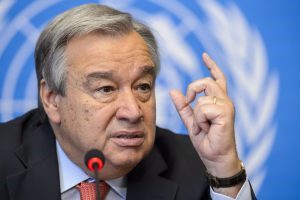United Nations Secretary-General António Guterres announced on Wednesday that he will request the UN to take on the financial responsibility for the structural and logistical expenses of a multinational force in Haiti, which is struggling to combat violent gangs. This announcement was made during a three-day CARICOM (Caribbean Community) conference in Barbados, where leaders from the 15-member bloc gathered to discuss regional issues, including the escalating gang violence in Haiti.
Guterres expressed hope that the UN Security Council would approve the proposal, stating that it would enable the creation of a more effective force to tackle Haiti’s gang crisis and restore conditions conducive to democracy. He added that the salaries of the multinational force would be covered by an existing UN trust fund.
UN spokesperson Stephane Dujarric clarified that the proposed support would include logistics and non-lethal equipment, with a more detailed plan expected to be submitted by the end of February. The current mission, which started in June, involves approximately 800 Kenyan police officers alongside troops and police from countries such as Jamaica, Guatemala, and El Salvador, working in coordination with Haiti’s National Police.
Despite the ongoing mission, Haiti and the U.S. have raised concerns about its lack of personnel and resources. The Biden administration has already contributed around $600 million to the mission, but it remains unclear whether funding will continue under President Donald Trump. U.S. Secretary of State Marco Rubio recently affirmed that the administration would continue its support while urging wealthier nations to contribute more to the effort.
The situation in Haiti has become increasingly dire, with gangs recently carrying out at least four major massacres, resulting in hundreds of deaths. Guterres called the situation “appalling” and stressed the urgent need for a political process led by the Haitian people to restore democratic institutions through elections. “Gangs are inflicting intolerable suffering on a desperate and frightened people,” he said.
However, the International Crisis Group, based in Belgium, cautioned that holding elections prematurely could exacerbate the situation, given the intensifying gang violence. Haiti has not held elections in nearly a decade, and since the assassination of President Jovenel Moïse in 2021, the country has been under the control of a transitional government. Prime Minister Alix Didier Fils-Aimé and a nine-member presidential council are set to remain in power until February 2026.
While the council has pledged to hold elections by early 2026, critics argue that the goal may be unrealistic, as gangs currently control 85 percent of the capital, Port-au-Prince, and are actively expanding their territories. Council President Leslie Voltaire has expressed optimism that elections could be held in some regions by November 2025, but only in areas not dominated by gangs.
The International Crisis Group also highlighted the challenges to holding elections, including a shortage of funds. While an estimated $90 to $120 million is needed, only $45 million has been raised so far. The group also pointed out the detrimental effects of ongoing political dysfunction, including partisan infighting and corruption allegations, which have further complicated the situation.
The violence, which claimed more than 5,600 lives in 2024, has displaced over one million Haitians in recent years, according to the UN. The ongoing violence, combined with the lack of resources and political stability, has led many to question the feasibility of holding elections in the near future without worsening the crisis.
As the international community debates the way forward, Guterres and other UN officials are focused on finding ways to strengthen the mission and offer more substantial support to the Haitian government, as well as ensuring that the country’s political process remains Haitian-led and inclusive.















